The Meaning Behind the 10-Day Vegetarian Diet You Should Know
The 10-day vegetarian diet is a traditional Buddhist practice that offers spiritual, health, and environmental benefits. In this article, Vo Uy Vegan Restaurant will guide you through the 10-day vegetarian calendar, its deeper meaning, sample plant-based menus, and tips for practicing it properly—helping you embrace a peaceful lifestyle with ease.
Introduction to the 10-Day Vegetarian Diet
What Is the 10-Day Vegetarian Diet?
The 10-day vegetarian diet, also known as “Thập Trai” in Vietnamese, refers to abstaining from meat and animal products on 10 specific days each lunar month. Popular among Buddhists, this mindful eating practice helps cultivate compassion, avoid killing, and live a healthier, more conscious life. It’s not only spiritually meaningful but also promotes well-being and environmental sustainability.
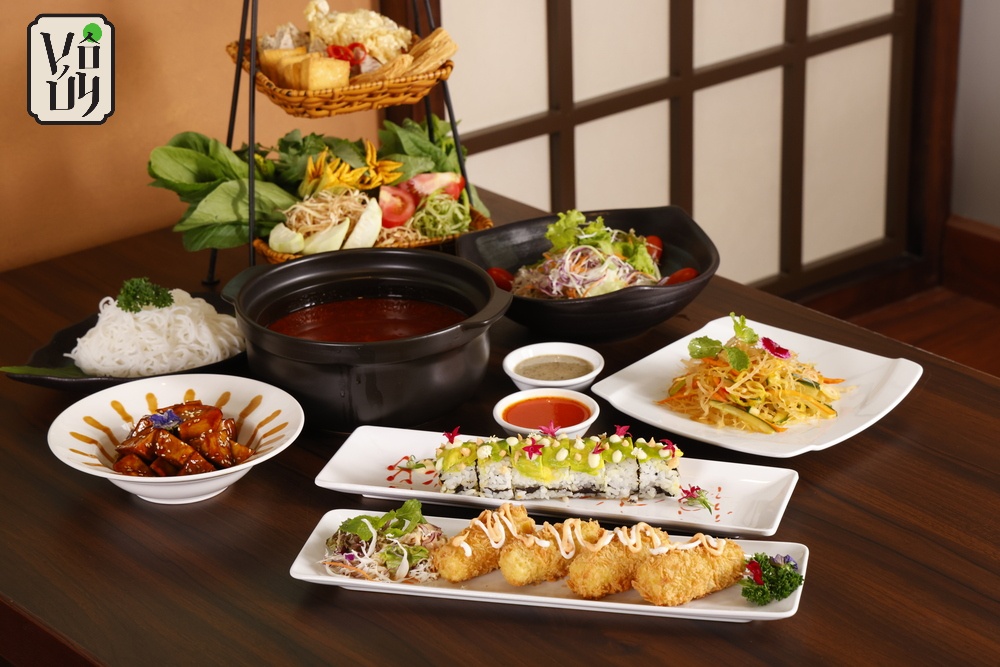
What Is the 10-Day Vegetarian Diet?
Benefits and Purpose of the 10-Day Vegetarian Diet
Practicing the 10-day vegetarian diet brings a wide range of benefits:
-
Spiritual: Cultivates compassion, reduces karmic obstacles, and honors sacred days connected to Buddha and Bodhisattvas.
-
Health: Helps lower cholesterol, support heart health, regulate blood sugar, and improve skin condition.
-
Environment: Reduces carbon emissions and lessens the demand for animal slaughter.
Who Should Try the 10-Day Vegetarian Diet?
This diet is suitable for many people—from devout Buddhists and health-conscious individuals to those exploring a more sustainable lifestyle. Whether you’re just starting out or already familiar with plant-based eating, the 10-day vegetarian diet is a flexible and accessible choice.
10-Day Vegetarian Fasting Schedule in a Month
According to Buddhist tradition, the 10 vegetarian fasting days each month follow the lunar calendar and align with spiritually significant events:
-
1st: Enlightenment day of Định Quang Buddha – starting the month in purity.
-
8th: Enlightenment day of Medicine Buddha (Dược Sư Như Lai) – prayers for health and merit.
-
14th: Enlightenment day of Samantabhadra Bodhisattva – pursuit of wisdom.
-
15th (Full Moon): Enlightenment day of Amitabha Buddha – symbol of fulfillment.
-
18th: Enlightenment day of Avalokiteshvara (Quan Âm) – seeking peace.
-
23rd: Enlightenment day of Mahāsthāmaprāpta (Thế Chí Bồ Tát) – dispelling karmic obstacles.
-
24th: Enlightenment day of Kṣitigarbha (Địa Tạng Vương) – wishing for longevity.
-
28th: Enlightenment day of Vairocana Buddha – elimination of afflictions.
-
29th: Enlightenment day of Medicine King Bodhisattva – healing illness.
-
30th (or 27th/28th in short months): Enlightenment day of Śākyamuni Buddha – accumulating blessings.
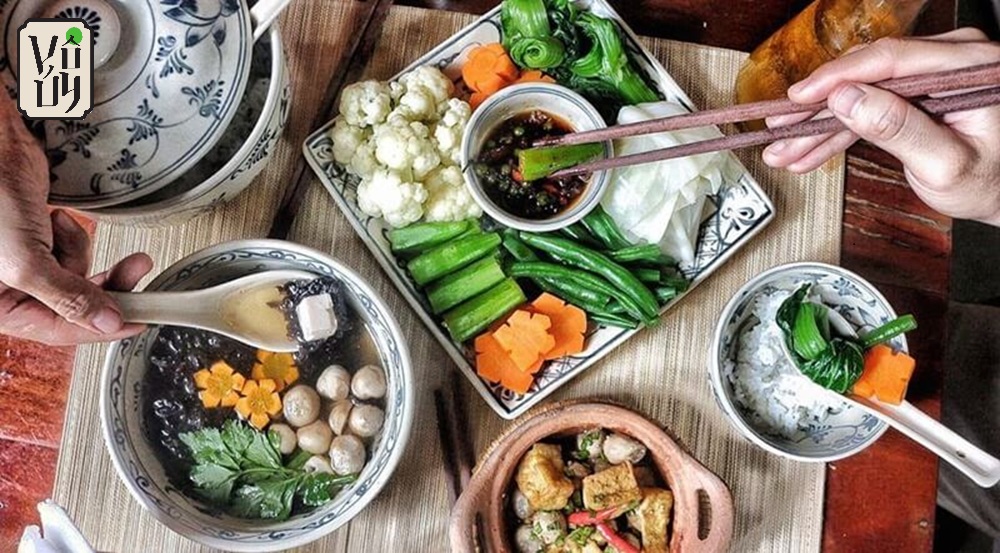
10-Day Vegetarian Fasting Schedule in a Month
To follow the 10-day vegetarian calendar correctly, you need to consult an accurate lunar calendar. Apps like “Ăn chay” on Windows Phone or trusted Buddhist websites can help. If you’re not familiar with lunar dates, use an online solar-lunar calendar converter.
Buddhism doesn’t require everyone to fast all 10 days. You can start with 2 (bi-monthly), 4, or 6 days depending on your health, faith, and schedule.
Meaning of the 10-Day Vegetarian Fasting Practice
Spirituality and Buddhism
Practicing vegetarianism for 10 days helps cultivate compassion, avoid killing, and purify the mind. Each day is linked to a sacred event, deepening your connection to Buddhist values. It’s also a time for self-reflection and living mindfully.
Scientific and Health Benefits
Science-backed advantages of vegetarianism include:
-
Heart Health: Plant-based fiber and unsaturated fats help reduce heart disease risks.
-
Blood Sugar: Reduces risk of type 2 diabetes by 35–53% through better glycemic control.
-
Skin Health: Antioxidants and vitamins from vegetables improve skin radiance and resilience.
Environment and Ethics
Eating vegetarian helps cut carbon emissions from livestock farming and reduces animal slaughter. It’s a sustainable lifestyle choice showing compassion and responsibility for all beings.
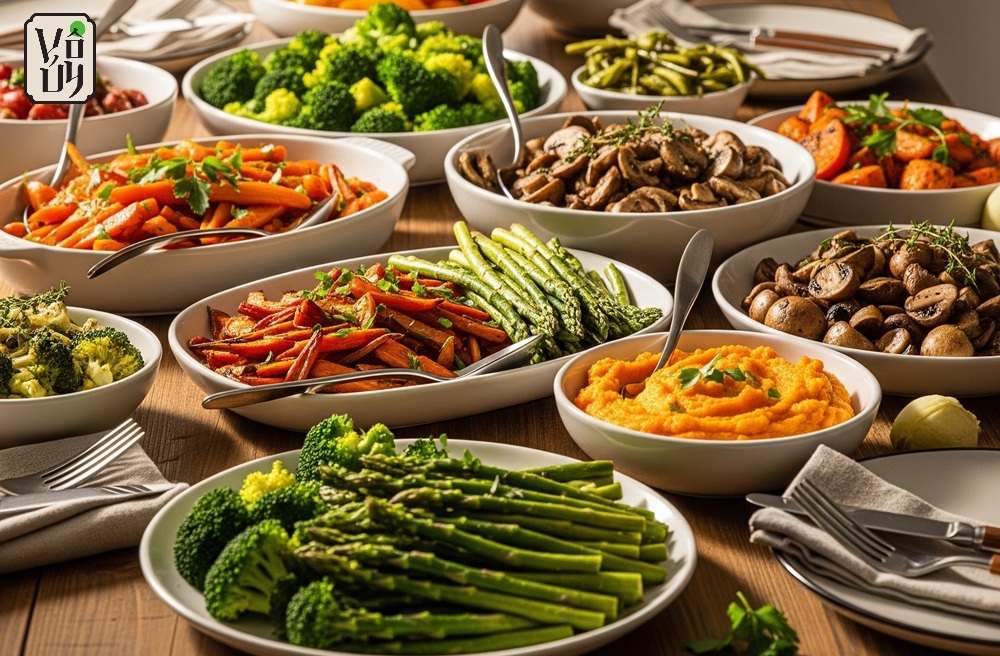
Meaning of the 10-Day Vegetarian Fasting Practice
Suggested 10-Day Vegetarian Menu at Vo Uy Vegan Restaurant
If you’re planning to follow a 10-day vegetarian diet, here’s a diverse and delicious meal plan offered by Vo Uy Vegan Restaurant that you can refer to:
-
Day 1: Vegan crab noodle soup (Bún riêu chay), fresh herbs, vegan dipping sauce.
-
Day 8: Lotus seed rice, premium vegan soup, crispy mushroom tempura.
-
Day 14: Vegan rice paper rolls (Bánh đa chay) with aromatic herbs.
-
Day 15: Vegan crab hotpot, mushroom salad with passion fruit sauce.
-
Day 18: Avo rice, braised tofu with seasonal veggies, pumpkin soup.
-
Day 23: Vegan pho with bean sprouts and basil.
-
Day 24: Vegan spring rolls (Bì cuốn chay), peanut dipping sauce, fresh herbs.
-
Day 28: Vegan bánh hỏi, fried spring rolls, coconut shoot salad.
-
Day 29: Mixed vegan udon noodles, crispy rice rolls, steamed veggies.
-
Day 30: Vegan Hue noodle soup, roasted pumpkin salad, tofu with vegan cheese sauce.
These dishes are crafted not only to support your 10-day vegetarian diet but also to delight your senses with plant-based flavors that nourish both body and spirit.
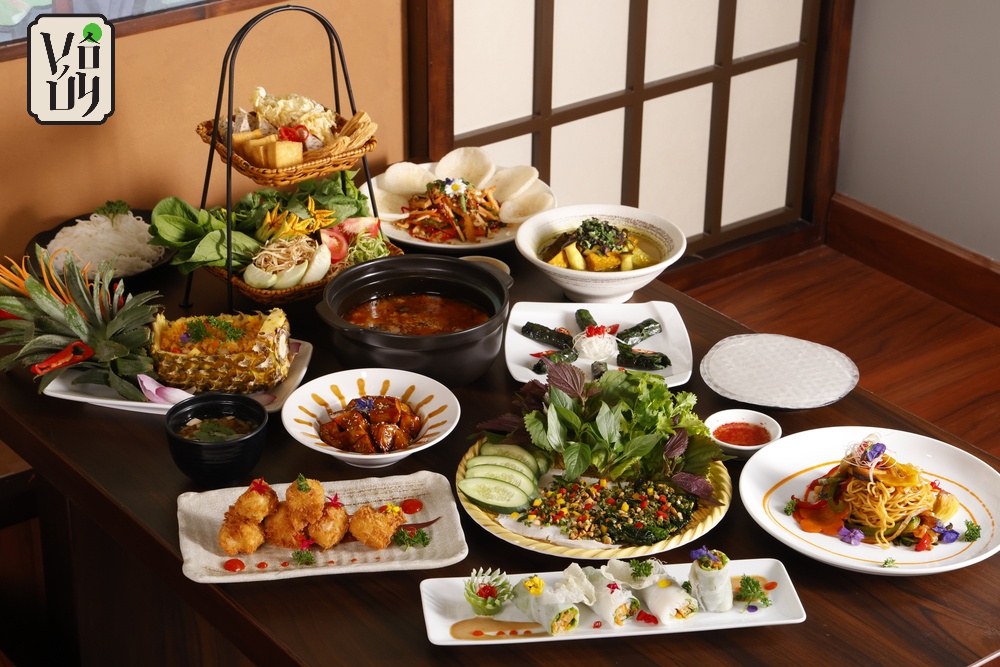
Suggested 10-Day Vegetarian Menu at Vo Uy Vegan Restaurant
Come to Vo Uy Vegan Restaurant and discover a world of refined vegan cuisine made from the freshest ingredients, blending traditional Vietnamese flavors with modern creativity. Here, you’ll not only enjoy delicious and wholesome plant-based meals but also find peace and warmth in our serene, cozy atmosphere.
Reserve your table today at:
- Address: 47 Street No. 3, CityLand Park Hills Residential Area, Ward 10, Go Vap District, Ho Chi Minh City
- Hotline: 0902 353 527
- Website: https://nhahangvouy.com/
- Fanpage: https://www.facebook.com/nhahangchayvouy
- Google Maps: Link Google Maps
How to Follow a Proper 10-Day Vegetarian Diet
Beginner’s Guide to a Balanced Vegetarian Journey
If you’re new to vegetarianism, start with 2–4 vegetarian days per month and gradually increase to 10 days as your body adjusts. Make sure to understand how to balance nutrition—especially supplementing with vitamin B12 through nutritional yeast or fortified plant-based milk. For children, pregnant women, or the elderly, it’s best to consult a nutritionist to maintain good health.
A Spiritual Path, Not Just a Diet
Vegetarianism is more than a change in meals—it’s a spiritual journey. During vegetarian days, try to practice mindfulness, meditation, or chanting to nurture inner peace. Avoid stress and maintain a joyful, compassionate mindset to fully embrace the meaning of vegetarian living.
Comparing Popular Vegetarian Diet Plans
| Plan | Days per Month | Description | Best For |
|---|---|---|---|
| Nhị Trai | 2 | 1st and 15th lunar days | Beginners |
| Tứ Trai | 4 | 1st, 8th, 15th, 23rd (or 30th) | Those wanting gradual increase |
| Lục Trai | 6 | 8th, 14th, 15th, 23rd, 29th, 30th | Experienced practitioners |
| Thập Trai | 10 | 1st, 8th, 14th, 15th, 18th, 23rd, 24th, 28th, 29th, 30th | Devotees aiming for deeper practice |
| Nhất Ngoạt Trai | Full month | Entire months: 1st, 7th, 10th lunar month | Those seeking spiritual challenge |
| Strict Vegan | Ongoing | All the time | Long-term vegetarians, deeply committed Buddhists |
Among them, the 10-day vegetarian diet (Thập Trai) is ideal for busy individuals—it allows a spiritual connection without overwhelming your schedule. You can adjust the number of days flexibly, unlike the commitment required for a lifelong vegan lifestyle.
Conclusion
A 10-day vegetarian practice not only purifies your soul but also enhances health and contributes to environmental protection. Start small with 2–4 days, plan your meals, and embrace the positive transformation in both body and mind. To make your journey more enjoyable, consider dining at Vo Uy Vegan Restaurant on vegetarian days—it’s a refreshing change with soulful, plant-based cuisine.
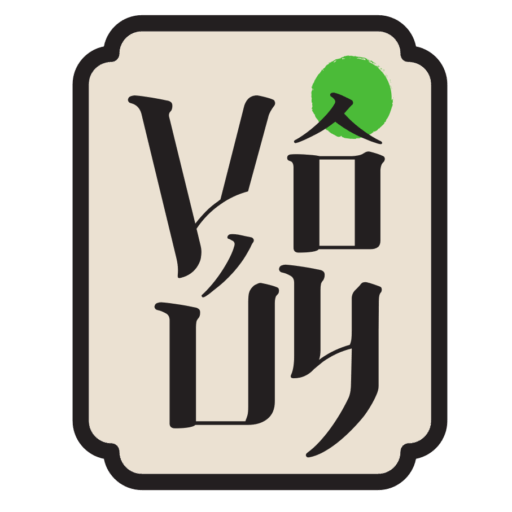

 0902 353 527
0902 353 527  cskh@nhahangvouy.com
cskh@nhahangvouy.com 

